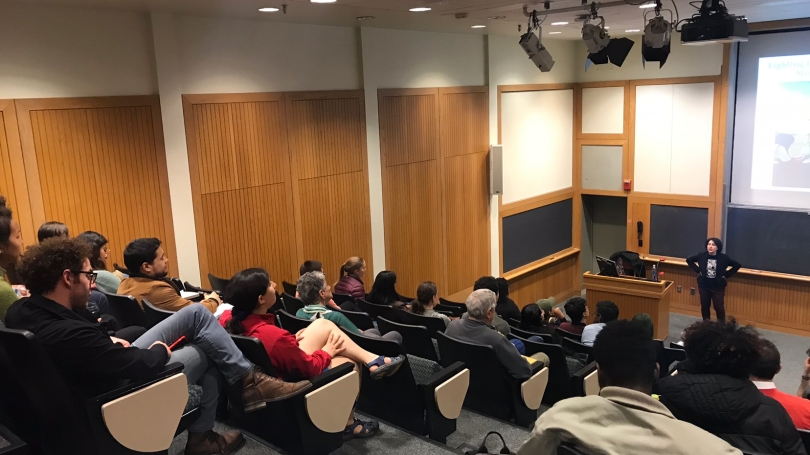
- Public Policy
- Leadership
- Funding
- News & Events
- About the Center
Back to Top Nav
Back to Top Nav
Back to Top Nav
Back to Top Nav
Every year, Al-Nur holds Islam is Green week in order to present our community of students and faculty the opportunity to do to engage with one another. Our primary aim is to invite notable American Muslim speakers that speak to experiences of both the Dartmouth Muslim community and otherwise. This year, we chose the relevant theme of women in Islam and immigration and intersectionality. The speakers brought in were Azadeh Shahshani and Mariam Rauf.
Azadeh Shahshahani is a notable human rights activist who has worked on the international stage for many years, protecting the rights of the marginalized including particularly the Middle Eastern and South Asian communities. Her presentations were titled, “Waging a Battle for Human Rights:Project South's Protect and Defend Initiative” and “What are my Constitutional Rights?”. They were very helpful to students as they learned about the social justice work done in Southern states to help immigrants. Shahshahani brought up many examples of the Project South group shutting down detention centers that were inhumane towards people.
Shahshani also held a coffee talk with students interested in promoting activism in their fields of study and possible future careers. The students gathered around and had a very productive dialogue and many of them learned how to implement social justice work in areas that are normally not seen as active in community service.
The other speaker was Mariam Rauf, who works with domestic violence and sexual assault prevention and resources in New York City. During her work with Asian/Pacific Islander Domestic Violence Resources Project, she developed and conducted a workshop on intersectionality, which she has since conducted in various university campuses, including Harvard University. While at Dartmouth, she held an intersectionality workshop and a dinner discussion.
This workshop focused on the experiences of the communities of color. Themes included the experiences of the colored community shaped on systematic (state) level; trauma and oppression, societal norms and expectations, and internalized oppression. By discussing these underlying issues, we built a deeper understanding of ourselves and those around us. While the turnout for this event was rather small, the dinner discussion after the workshop was well-attended. These events brought up themes that many Dartmouth students found extremely useful. In light of the recent sexual misconduct allegations in Dartmouth’s Psychological and Brain Sciences Department, we believe that is important for students to become more knowledgeable on sexual assault prevention and gain awareness of the many ways that domestic violence affects various communities. From this event, Dartmouth students benefited from learning about communities affected by domestic violence that are often not part of mainstream conversations such as refugees and immigrants.
-Submitted by Arij Elfaki '21, Rockefeller Center Mini Grant Recipient
The Rockefeller Center's Mini-Grants program funds registration fees for students attending conferences, as well as the costs of bringing guest speakers to Dartmouth. The views and opinions expressed here are the author’s own and do not necessarily represent the views and opinions of the Rockefeller Center or constitute an endorsement by the Center.